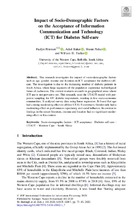| dc.contributor.author | Tucker, William D | |
| dc.contributor.author | Baker, Adiel | |
| dc.contributor.author | Petersen, Fazlyn | |
| dc.contributor.author | Pather, Shaun | |
| dc.date.accessioned | 2020-10-30T08:55:32Z | |
| dc.date.available | 2020-10-30T08:55:32Z | |
| dc.date.issued | 2020 | |
| dc.identifier.citation | Petersen, F., et al., 2020. Impact of Socio-Demographic Factors on the Acceptance of Information Communication and Technology (ICT) for Diabetes Self-care. Lecture Notes in Computer Science, pp.73-83. | en_US |
| dc.identifier.other | DOI: 10.1007/978-3-030-45002-1_7 | |
| dc.identifier.uri | http://hdl.handle.net/10566/5325 | |
| dc.description.abstract | This research investigates the impact of socio-demographic factors
such as age, gender, income and location on ICT acceptance for diabetes selfcare.
The investigation is due to the increasing number of diabetic patients in
South Africa, where large segments of the population experience technological
forms of exclusions. The context warrants research in geographical areas where
ICT use is not pervasive yet. This research, used the UTAUT model with purposive
sampling for 497 diabetic respondents, residing in low socio-economic
communities. It analysed survey data using linear regression. It found that age
had a strong moderating effect on all four UTAUT constructs. Gender only had a
moderating effect on performance expectancy and social influence. In contrast to
findings in the extant literature, income and location had no significant moderating
effect in this context. | en_US |
| dc.language.iso | en | en_US |
| dc.publisher | Springer Nature Switzerland | en_US |
| dc.subject | Socio-demographic factors | en_US |
| dc.subject | ICT acceptance | en_US |
| dc.subject | Diabetes self-care | en_US |
| dc.subject | UTAUT | en_US |
| dc.subject | Western Cape | en_US |
| dc.subject | South Africa | en_US |
| dc.title | Impact of Socio-Demographic Factors on the Acceptance of Information Communication and Technology (ICT) for Diabetes Self-care | en_US |
| dc.type | Article | en_US |

